North Korea ruling party meeting to address ‘urgent’ agricultural needs
Sign up now: Get insights on Asia's fast-moving developments

The country is routinely struck by natural disasters such as floods and heavy rains that damage summer crops.
PHOTO: REUTERS
SEOUL – Leading members of North Korea’s ruling party will meet in February to discuss the “urgent” task of improving the country’s agricultural sector, as international experts say food insecurity has worsened amid sanctions and Covid-19 lockdowns.
State news agency KCNA reported that the Workers’ Party of Korea (WPK) Politburo decided on Sunday that a larger plenary meeting of its central committee will gather in late February.
“It is a very important and urgent task to establish the correct strategy for the development of agriculture and take relevant measures for the immediate farming in the present stage of the struggle to promote the overall development of socialist construction.”
The Politburo recognised that “a turning point is needed to dynamically promote the radical change in agricultural development”, said KCNA.
In January, the United States-based 38 North programme, which monitors North Korea, said in a report that “food availability has likely fallen below the bare minimum with regard to human needs”, with food insecurity at its worst since the famines of the 1990s.
“Resolving North Korea’s chronic food insecurity would require, among other things, strengthening property rights, opening and revitalising the industrial and service sectors of the economy, and embracing an export-oriented model,” said the 38 North report.
“The regime, which fears internal competition and its own demise, has so far proved itself unwilling to pursue such reforms.”
North Korea is under strict international sanctions over its nuclear weapons and ballistic missile programmes. Border trade has been further choked by self-imposed Covid-19 lockdowns.
Those lockdowns have partially eased in recent months, with some trade resuming between North Korea and Russia and China, though at still limited levels.
The country is also routinely struck by natural disasters such as floods and heavy rains that damage summer crops. REUTERS


